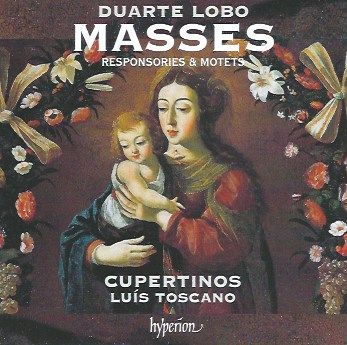Music of Duarte Lobo with Los Cupertinos
Beauty is beauty is beauty; and this is full 70 minutes of it

The Golden Age of Portuguese polyphony is a cause dear to the group Cupertinos' heart (itself from Portugal), as a truly memorable concert at London's Cadogan Hall in February this year revealed (you can read my review here). In their capacity as ambassadors of Portuguese polyphony, Los Cupertinos and their director Luís Toscano takes their role in life seriously.
The first disc that alerted me to them was a previous Hyperion release of Manuel Cardoso's Lamentations for Maundy Thursday, Magnificat and motets (purchase link also below).
I held an article on this disc back for a month or so specifically because some of the music here is Christmas responsories, and as we move towards the so-called holiday season, this seems a great place to kick off the articles on Christmas-related disc that will sprinkle their way through Classical Explorer's December like a snow flurry.
So here is the first bauble on our tree this year, and we begin with a "taster" video for the new album:
The disc is perfectly structured. A motet, Audivi vocem de caelo (I heard a voice from Heaven) with its text from Revelation and its glorious, almost sighing, descending lines cedes to the first mass, the four-part Missa Sancta Maria. The other mass, Missa Elisabeth Zachariae in five parts, is heard at the end of the disc; eight Christmas Responsories separate them.
The first piece Audivi vocem de caelo, is the most famous, and in the absence of a Cupertinos video, here's the Choir of Queen's College, Oxford (I chose this one because you can follow the score on-screen as the music plays):
The two Masses are so-called "parody" masses: they take as a basis a pre-extant work, not just melodically but extending to structural and larmonic elements also. in this case motets by the Seville composer Francisco Guerrero (1528-99). Recorded in the suuportive acoustic of the Basilica Bom Jésus, Braga, Portugal, the music shines.
The four-part Christmas Responsories are reconstructed with a new tenor part by Professor José Abreu of the University of Coimbra. You can hear part of "Hodie nobis caelorum rex" in the Hyperion video above. The deliciously dancing rhythms of the opening part of "Hodie nobis de caelo" (Today true peace has come down from Heaven) remind us this is a time of celebration; the later radiant harmonies echo this joy. But Christmas was once a time of contemplation, too, and Lobo's music honours this, too; the reverberation of the Basilica seems to deepen the internalisations of O Magnum Mysterium. Each responsory has its own character; together they are like a multi-faceted jewel.
The final item is the eight-voice antiphon Alma redemptoris mater, printed in the same collection as the Christmas Responsories.
Cupertinos' performances of Lobo persuade us on a deep level, irrespective of one's personal beliefs (or lack of them). Beauty is beauty is beauty; and this is full 70 minutes of it.
